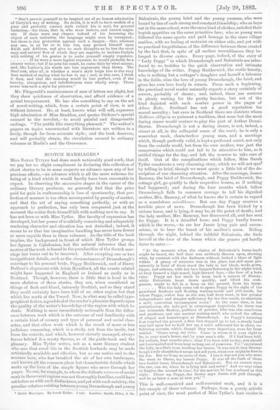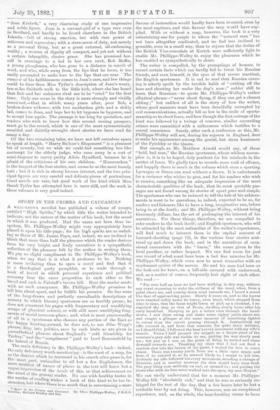SCOTCH MARRIAGES.*
Miss SARAH TYTLER had done much noticeably good work, that we pay her no slight compliment iu declaring this collection of short stories to be in some respects an advance upon any of her previous efforts,—an advance which is all the more welcome for being of a kind which it would hardly have been reasonable to -expect. In observing the successive stages in the career of the ordinary literary producer, we generally find that the price paid for gain in craftsmanship is loss of spontaneity, that per- fection of manner is too often accompanied by paucity of matter, :and that the art of saying something perfectly, or with an approach to perfection, has only been conquered just at the moment the writer finds himself left with nothing new to say. It has not been so with Miss Tytler. Her faculty of expression has developed, but her power of truthfully conceiving and adequately rendering character and situation has not dwindled ; indeed, it seems to us that her imaginative handling has never been firmer or more capable than in these volumes. As the title of the book implies, the background in front of which Miss Tytler groups her figures is Caledonian, but the natural inference that the motive of the work is found in the peculiarities of the Scotch mar- riage law turns out to be incorrect. After excepting one or two insignificant details, such as the circumstances of Drumsbeugh's marriage to his peasant bride, Peggy Hedderwick, and of Harry Balfour's elopement with Ailsie Hyudford, all the events related might have happened in England or Ireland as easily as in Scotland. Though, however, there is little that is local in the ;mere skeleton of those stories, they are, when considered as things of flesh and blood, intensely Scottish, and as they stand they could certainly have been told of no other region but that which lies north of the Tweed. Now, in what may be called typo- graphical fiction, a good deal of the reader's pleasure depends upon the quality of the writer's knowledge of the region with which he deals. Nothing is more immediately noticeable than the differ- .ence between work which is the outcome of real familiarity with a certain kind of scenery and type of personal aud social char- acter, and that other work which is the result of more or less judicious cramming, which is a study, not from the inside, but from the outside, and which, however cleverly managed, always haves behind it a musty flavour, as of the guide-book and the glossary. Miss Tytler writes, not as a mere literary student who sees that rural life in the Scottish lowlands may be made artistically available and effective, but as one native and to the manner born, who has breathed the air of her own landscapes, and known all the common-place but characteristic details which make up the lives of the simple figures who move through her pages. No one, for example, to whom the delicate nuances of social rank in these rural regions was not thoroughly familiar, could have set before us with such distinctness, and yet with such subtlety, the peculiar relation existing between young Drumsheugh and young Scotch Mailiageo. By Sarah Tytler, 3 yob, Loudon: Smith, Elder, & Co.
Balcairnie, the young laird and the young yeoman, who were bound by ties of such strong and constant friendship; who as boys
sat in the same school, wore the same kind of clothes, satisfied their boyish appetites on the same primitive fare; who as young men followed the same sports and paid homage to the same village maiden, with no feeling of restraint on either side, and yet with no practical forgetfulness of the difference between them created by the fact that, in spite of all surface resernblauces, they be- longed to diverse castes. Every page, indeed, of the story of " Lady Peggy" in which Drumsheugh and Balcairnie are intro-
duced to us, testifies to the quick observation and intimate knowledge of the writer. Peggy Hedderwick, the rustic beauty, who is nothing but a cottager's daughter and herself a labourer in the fields, wins the love of young Drumslieugh, the laird, and gives her own love freely in return. From such a beginning, the practised novel reader naturally expects a story certainly of sorrow, probably of shame ; and, indeed, there :are sorrows in plenty waiting for the pretty heroine, but not of the kind depicted with such sombre power in the pages of Adam Bede. Scotland has not a good reputation for sexual morality ; but even in Scotland there are districts where Noblesse oblige is so puissant a tradition, that none but the most daring sinner would venture to play the part of Arthur Donni- thorne. Drumsheugh is not a daring sinner, is not, indeed, a sinner at all, in the colloquial sense of the word; he is only a somewhat weak, characterless young man, and a marriage which, though perfectly valid, is kept a profound secret., not only from the outside world, but from his own mother, was just the compromise which could not fail to be attractive to him, as it settled things for the day, and left the morrow to take care of itself. Out of the complications which follow, Miss Sarah
Tytler constructs a very charming story, which we will not spoi/ by telling in brief, though we must quote a. little bit of the de- scription of one charming situation. After the marriage, James Ramsay, the laird of Drumsbeugh, and Peggy Hedderwick, the cottage girl, go quietly to their respective homes, as if nothing had happened ; and during the four months which follow Drumslieugh fails to summon courage to tell his dignified mother, Mrs. Ramsay, of what he knows she is certain to regard as a scandalous mesalliance. But one day Peggy receives a terrible piece of news. Drumsheugh has been kicked by a vicious horse, and is lying, it may be, at the point of death; and the lady mother, Mrs. Ramsay, has discovered all, and has sent for Peggy. It is a dreadful hour, and Peggy hardly knows which is the worse,—to see her Jamie lying pale and uncon- scious, or to bear the brunt of his mother's scorn. Riding through the night, behind the faithful Balcairnie, she finds herself at the door of the house which she yearns yet hardly dares to enter :— "At the moment when the clatter of Balcairnie's horse-hoofs might be heard, the hall door was suddenly thrown open, showing what, by contrast with the darkness without, looked a blaze of light within. A group of servants was in the glare, but still more pro- minently in front of them stood the lady in her black, mode gown, tippet, and mittens, with her lace lappets fluttering in the night-wind, as they framed a high-nosed, high-brewed face,--the face of a born ruler. Peggy sot her teeth to keep back a scream of dismay, while Balcairnie leapt down quickly, rind lifted his com- panion, ready to fall in a heap on the ground, from his horse. Was the lady come out to spurn Peggy in the sight of the powdered flunkeys and flouting waiting-maids and still-maids, for whom Peggy, cotter lass as she was, had been wont, in her greater independence and simpler sufficiency for her few needs, to entertain a mild, somewhat inconsequent scorn ? At the same time, in her perturbation, she indu:ged in extravagant hyperbole, for there was one miserable flunkey, guiltless of powder, who was also coachman and gardener, and one ancient waiting-maid, who united the odious of abigail and housekeeper at Drumsheugh. As Peggy's tottering feet touched the ground, a firm foot stepped up to her, a steady hand was laid upon her to hold her up, a voice addressed her in clear, un- faltering accents, which, though they were imperious, were far from unkind. 'Come away, my dear. Come in where it is your right to be, in your man's house, and by your man's side. If 1 had been told, for certain, four months since, what I've been told to-day, you should not have waited and been kept so long out of yourown. Fie!' exclaimed the lady, in a little heat, bending her brows, 'it was not fit that Drums- heugh's wife should shaw neeps and sell yarn, whatever might be free to his Joe. But we'll say no more of that. I ken it was not you who were the most to blame, my bonnie Peggy. It was all the fault of those two foolish loons, Drum sheugh and Baloairaie. But we cannot wyte the one, can we, when he is lying sick and sorry ? And we may come to forgive the second in time, for the service ho has rendered us this night. Cheer up, Peggy, the doctor says Jamie will pull through, and be as braw a man as ever yet.'" This is well-conceived and well-executed work, and it is a fair sample of these volumes. Perhaps, from a purely artistic point of view, the most perfect of Miss Tytler's four stories is
"Jean Kinloch," a very charming study of one impressive and noble figure. Jean is a servant-girl of a type rare even in Scotland, and hardly to be found elsewhere in the British Islands,—full of strong emotion, but with rare power of reticence and repression ; with a stern sense of duty, not merely as a personal thing, but as a great external, all-embracing reality ; a woman of dignity all compact, and yet not without a certain intangible, elusive grace. She has promised her- self in marriage to a lad in her own rank, Bob Meffin, a young ploughman, who has gone to a distance in search of work, and who, while away from the lips that be loves, is too easily persuaded to make love to the lips that are near. The rumour of his faithlessness comes to Jean's ears, and few things could be finer than Miss Tytler's description of Jean's weary, ten-miles Sabbath walk to the little kirk, where she has heard that Bob and her unknown rival are to be "cried" for the first time. Only one scene in the story is more strongly and vividly conceived,—that in which, many years after, poor Bob, a broken-down widower, with two motherless girls and a sickly lad, comes to Jean, and begs her to let bygones be bygones, and to accept him again. The passage is too long for quotation, and readers who wish to know how this second wooing prospers, must go to the record, which is one of the most symmetrically moulded and daintily-wrought short stories we have read for many a day.
Of the two remaining tales, we have not left ourselves space to speak at length. "Harry Ba'four's Elopement" is a pleasant bit of comedy, but we wish we could feel something less like -contempt for the elderly judge, who runs away in a sort of semi-disguise to marry pretty Ailsie Hyndford, because he is afraid of the criticisms of his own children. " Hamesucken " is the longest of the four stories, and seems to us the most loosely !knit; but it is rich in strong human interest, and, the two prin. cipal figures are very careful and delicate pieces of portraiture. Good novels are rare, but good work of the kind which Miss Sarah Tytler has attempted here is rarer still, and the work in these volumes is very good indeed.



































 Previous page
Previous page